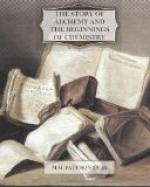“When I heard the admonition, I did not know whether to be sad or joyful. ‘Depart,’ then said Mercury, ’with this bridal gift, and when you come to those disciples who have seen the Lord himself, show them this sign.’ And therewith he gave me a gold ring from his son’s finger. ’They know the golden branch which must be consecrated to Proserpina before you can enter the palace of Pluto. When he sees this ring, perhaps one will open to you with a word the door of that chamber, where sits enthroned in his magnificence the Desire of all Nations, who is known only to the Sages.’
“When he had thus spoken, the vision vanished, but the bridal gift which I still held in my hand shewed me that it had not been a mere dream. It was of gold, but to me more precious than the most prized of all metals. Unto you I will shew it when I am permitted to see your faces, and to converse with you freely. Till that earnestly wished-for time, I bid you farewell.”
One result of the alchemical modes of expression was, that he who tried to follow the directions given in alchemical books got into dire confusion. He did not know what substances to use in his operations; for when he was told to employ “the homogeneous water of gold,” for example, the expression might mean anything, and in despair he distilled, and calcined, and cohobated, and tried to decompose everything he could lay hands on. Those who pretended to know abused and vilified those who differed from them.
In A Demonstration of Nature, by John A. Mehung (17th century), Nature addresses the alchemical worker in the following words:—
“You break vials, and consume coals, only to soften your brains still more with the vapours. You also digest alum, salt, orpiment, and altrament; you melt metals, build small and large furnaces, and use many vessels; nevertheless I am sick of your folly, and you suffocate me with your sulphurous smoke.... You would do better to mind your own business, than to dissolve and distil so many absurd substances, and then to pass them through alembics, cucurbits, stills, and pelicans.”
Henry Madathanas, writing in 1622, says:—
“Then I understood that their purgations, sublimations, cementations, distillations, rectifications, circulations, putrefactions, conjunctions, calcinations, incinerations, mortifications, revivifications, as also their tripods, athanors, reverberatory alembics, excrements of horses, ashes, sand, stills, pelican-viols, retorts, fixations, etc., are mere plausible impostures and frauds.”
The author of The Only Way (1677) says:




